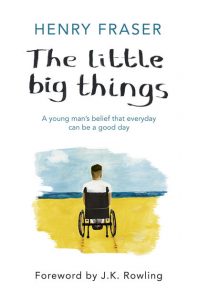 The facts are simple: on a holiday in Portugal 17 year-old Henry Fraser had a complete cervical spinal cord injury which left him paralysed and needing ventilation. Over the next two years he went through rehabilitation both at Stoke Mandeville hospital and at home, trained himself to survive without a ventilator and learnt how to balance in his wheelchair. He became an accomplished mouth painter and motivational speaker, and wrote this book.
The facts are simple: on a holiday in Portugal 17 year-old Henry Fraser had a complete cervical spinal cord injury which left him paralysed and needing ventilation. Over the next two years he went through rehabilitation both at Stoke Mandeville hospital and at home, trained himself to survive without a ventilator and learnt how to balance in his wheelchair. He became an accomplished mouth painter and motivational speaker, and wrote this book.
But this book is much more than a factual account, however useful that might be for clinicians or for others in the same situation. Henry Fraser is an inspirational person because of his attitude. He shares insights into how he approaches life that are relevant and useful for everyone – insights that came through his experience of injury and loss. At the heart of his positive approach lies a total acceptance of who he had become after his injury – comparisons with who he was before his injury were pointless, since anger and resentment about his injury would not help recovery. Henry is honest about when he lacks this sense of acceptance: later in rehab he overworks himself, doing physiotherapy, mouth painting commissions and speaking engagements all at once. As a result he goes down with an illness, learning the hard way that he needs to know how much rest he requires in order to cope with his endeavours. Only an honest acceptance of himself as he is will enable this. This is true for all of us, with or without an injury, and it is always difficult since those thresholds about what we can cope with will change, not just as a result of injury, but also as a result of other life demands, or illness, or ageing.
The other basic principle for Henry is gratitude. This is not a facile Panglossian doctrine about this being the best of all possible worlds, or even a sense that there is always someone worse off than him. Instead it comes out of his situation of utter despair and loss of control. After weeks in window-less hospital rooms Henry suddenly appreciated with new eyes his first experience of daylight and fresh air, and was profoundly thankful. There are other moments of intense experience and gratitude: when he first tastes water again; and when he feels the warmth of Spring. These moments of gratitude partly come from his losses: the water tastes so good partly because of a prolonged period of ‘nil by mouth’, and the Spring sunshine feels good because he has lost the ability to regulate his body temperature. But Henry takes this a stage further and realises how much he had taken for granted and failed to notice. He is intensely grateful for his family’s love and support – even though he was never without them.
Henry’s intense application to rehabilitation – and he obviously works extremely hard – emerges from his acceptance of what he can do, with an additional desire to expand the limits of that envelope. He is not lost in the future, dreaming about the remotely possible, but working in the present to increase his current abilities. Again, this applies to all of us.
For the clinician there are some very interesting sections about the unambitious one-size-fits-all approach of Stoke Mandeville’s rehabilitation team, contrasting with the problem-solving attitude of his private physio that he was working with at home. This echoes the thoughts of Claire Lomas about her NHS rehabilitation in Sheffield.
Which brings me to the subject of social capital. Henry, like Claire Lomas, is blessed with a large and resourceful network of family and friends, who work to obtain funding for extra equipment and therapy. He also expresses very strongly his view that he has been personally empowered by their encouragement and unconditional love. It is hard to see how his point of ultimate despair could have been followed by his philosophy of acceptance and gratitude without this network of support, and the emotional and material resources they provide.
Henry’s inspiring story is relevant to all of us, whoever we are. It is a short and very easy read. Highly recommended.
Websites:
www.henryfraser.org
www.henryfraserart.com
Fraser, Henry (2017) The Little Big things, London, Seven Dials
Audiobook available: https://www.audible.co.uk/pd/The-Little-Big-Things-Audiobook/B074QQNXRB